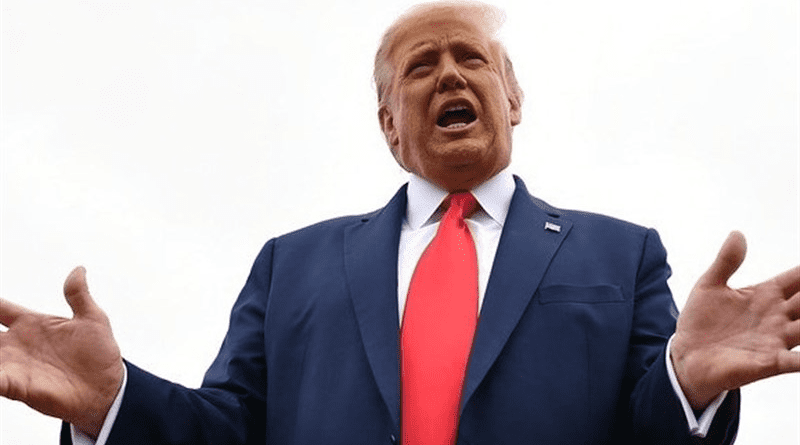Independent Counsel Indicts Trump – OpEd
Authorities made public a 37-count indictment against Donald Trump. The full text, courtesy of Politico, can be found here. Also charged in the indictment is Waltine Nauta, Trump’s valet. This indictment is nothing like Alvin Bragg’s pathetic effort to bring state criminal charges against Trump in Manhattan. Special Counsel Jack Smith, who is in charge of the Trump document-concealment case, is the real deal. He has served as a state and federal prosecutor, chief of the Justice Department’s public integrity unit from 2010 to 2015, US Attorney in Tennessee, vice president of litigation for the Hospital Corporation of America, and chief prosecutor in The Hague, where he investigated war crimes in Kosovo. Alvin Bragg he is not.
The indictment is a “speaking indictment,” meaning it outlines the charges and evidence at great length. Of course, an indictment is just an allegation—not gospel. But a federal grand jury has found that the charges satisfy the probable cause standard. Frankly, if half of what is alleged in the document is true, Donald Trump is in big trouble.
At base, the indictment alleges that when Trump left the White House, he took hundreds of classified documents with him. Some were “confidential” (information that could cause damage to national security), others “secret” (information that could cause serious damage to national security), and others “top Secret” (information that could cause exceptionally grave damage to national security). They were stored in banker’s boxes at Mar-a-Lago Club in areas where the public had access. The indictment also revealed that Trump allowed some colleagues and reporters to examine certain classified documents.
However, the real problem for Trump is his response to the National Archives and Records Administration’s effort to have him turn over records that it noticed were missing. The matter escalated and the Department of Justice became involved. Trump then received subpoenas for documents. But, according to the indictment, rather than simply permitting his lawyers to go through all the boxes and turn over all classified documents, Trump (using his valet) relocated some of the boxes. Thus, when his lawyers certified they had been through everything and were turning all documents over, that was not a true statement—not because they lied, but because Trump duped them. That’s why when federal agents executed a search warrant at Mar-a-Lago, they found many more classified documents. Bottom line: If Trump allowed his lawyers to review everything and turn documents over, there would be no case here.
The first 31 counts of the indictment allege a violation of 18 U.S.C. 793(e). Each count is based on sensitive documents recovered during the search warrant. The elements of the offense are:
First, Defendant had unauthorized possession of, access to, or control over any document . . . relating to the national defense; and
Second, Defendant willfully retained the same and failed to deliver it to the officer or employee of the United States entitled to receive it.
The maximum statutory term of imprisonment is ten years for each violation. In federal court there are sentencing guidelines. The guidelines are no longer mandatory and binding on a court. Still, they must be used as a starting point for determining a sentence. Defendants are still sentenced within the guideline range 70 percent of the time. Hence, the guideline range is extremely important. According to the federal manual, offenses under 18 USC 793(e) are controlled by either 2M3.2 or 2M3.3 of the manual.
If the former guideline applies, Trump’s base offense level under the guideline would be 35 if top secret information was involved (and the indictment indicates it was). Without any other possible enhancements, and if Trump was found guilty of just one count, his range would be 168-210 months imprisonment. Of course, the statutory maximum is just ten years, so that is a cap unless Trump was convicted of multiple counts in which “stacking” is allowed. Thus he could receive more than ten years. If the latter guideline is used, the base offense level is 29 months for top secret information, and the advisory range for one count of conviction would be 87-108 months. Hence, under either guideline, Trump will likely face significant prison time.
Counts 32-35 of the indictment deal with obstruction of justice and conspiracy to obstruct justice. The guideline for those counts is 2J1.2 and carries a base offense level of 14. Without any enhancements, that translates into a range of 15-21 months
The final counts deal with false statements and would likely carry a base offense level making a defendant eligible for probation.
Here is my guess at what the independent counsel has already worked out or hopes to work out: Waltine Nauta will be offered, say, a plea to the false statement counts and a probationary sentence in exchange for full cooperation on Trump. If the valet rolls, and if half of what is in the indictment is true, the government easily proves the elements of the 18 USC 793(e) offenses. Trump is in quite a predicament. I do not see an easy way out of this.
Now, we are a long way from a trial or plea deals right now. But things look bleak for Trump. And it looks like he brought most of this on himself by his handling of documents and playing games with his lawyers and the government when officials tried to recover the documents.
This article was published by The Beacon

